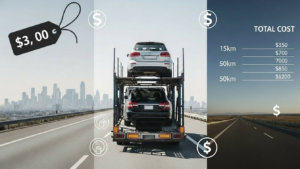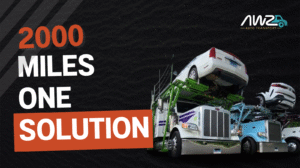How to Ship a Car with Personal Items Inside - Decoding Official Rules
Shipping your personal items within the car is a good shortcut, but is that practically possible? Usually, auto transport companies don’t allow more than 100 pounds of personal items. High value items like jewelry are not covered by the insurance, so they are not transported in the car due to the chances of theft. So, if you are preparing your car for shipping, comply with DOT regulations and avoid stuffing your items in the car, as they can cause possible delays at clearance points.
Worried about losing your personal belongings in the car? Get in touch with a trusted auto transport company for open or enclosed car shipping. We offer safe and reliable transportation solutions at an affordable price.
Can You Ship Your Car with Belongings Inside?
Yes, you can ship your car with personal belongings inside, but under restrictions. The Department of Transportation (DOT) hasn’t explicitly prohibited or approved shipping personal items during auto transport. This regulatory gray area means individual car shipping companies set their own policies.
Most auto transport carriers allow up to 100 pounds of personal items at no additional cost. Some companies permit up to 200 pounds with extra fees ranging from $100 to $200. All personal belongings must remain in the trunk or cargo area, stored below the window line to prevent theft and maintain driver visibility.
Your personal items won’t be covered by the carrier’s cargo insurance policy. Auto transport insurance covers vehicle damage but excludes personal belongings. This means you assume full responsibility for any theft, loss, or damage to items shipped inside your vehicle.
Does Your Car Have to Be Empty When You Ship It?
No, your car doesn’t need to be completely empty. Vehicle transport regulations allow certain items that belong with the vehicle to remain during shipping. Items that can stay include spare tire and jack, factory floor mats, owner’s manual, factory-installed accessories, and emergency roadside kit.
However, you must remove aftermarket electronics including GPS devices, radar detectors, and removable stereo systems. Electronic toll tags must come out because you’ll be charged tolls as the transport truck passes through toll stations. Custom accessories like spoilers, bike racks, and ski racks should be removed to prevent damage.
Vehicle shipping to or from Hawaii requires completely empty cars due to agricultural inspection requirements. International car shipping also typically requires empty vehicles due to customs regulations.
Understanding DOT Weight Policies for Personal Belongings
Every transport carrier must operate within federal DOT load-limit laws that cap the combined weight of truck, trailer, and vehicles on board. Because each company measures these thresholds differently, confirm your carrier’s personal-item allowance in advance. These regulations aren’t about small suitcases but about keeping highway safety standards intact and avoiding overweight penalties during inspection stops.
Safety and Security Concerns
Auto transport trucks make frequent stops at truck stops, rest areas, and fuel stations during multi-day journeys. These stops create opportunities for theft when valuable items are visible inside vehicles.
Professional drivers recommend the “parking lot rule” – pack your car as if you’re leaving it in an unfamiliar parking lot overnight. This means hiding all valuables, locking doors, and avoiding displays of electronics or expensive items. Items above the window line violate most carrier policies and increase theft risk.
The insurance gap for personal belongings is significant. Your homeowner’s or renter’s insurance might provide some coverage for personal items during transport, but verify this before shipping. Some auto transport brokers offer supplemental insurance for personal belongings, though this is uncommon and expensive.
Prohibited Items You Cannot Ship
Federal regulations prohibit the shipment of certain dangerous items in vehicles. The DOT’s Hazardous Materials Regulations specifically prohibit gasoline, propane tanks, paint, cleaning solvents, and aerosol products. Firearms and ammunition require special licensing that most auto transport carriers lack.
Perishable items including food, plants, and living organisms, are prohibited due to agricultural regulations. Prescription medications should travel with you rather than in your shipped vehicle.
High-value items like jewelry, cash, important documents, and electronics face significant theft risk. The car shipping industry strongly recommends against including these items due to insurance gaps and security vulnerabilities. Smart items to ship include basic clothing, books, non-fragile household items, and toiletries that have low theft appeal and can be easily replaced.
Smart Packing for Personal Items During Auto Transport
If your carrier allows limited belongings, focus on stability and weight balance. Keep everything below the window line, fill gaps with soft clothing to prevent shifting, and never stack items high enough to obstruct mirrors or windows. Photograph your trunk before hand-off to maintain an accurate record for your own reference.
Legal Compliance and Inspections
DOT inspections can occur randomly during auto transport operations. DOT officers have the authority to inspect all vehicles on car carrier trailers, including personal belongings inside shipped cars. These inspections can cause significant delays and potential confiscation of prohibited items.
Interstate auto transport falls under federal jurisdiction, while intrastate shipping may have additional state-specific regulations. Auto transport brokers who coordinate shipments must ensure all parties understand personal belongings policies to avoid problems at pickup.
Shipping Process and Documentation
When requesting auto transport quotes, specify that you plan to include personal items. This allows carriers to provide accurate pricing and policy information upfront. During vehicle pickup, the auto transport driver will conduct a detailed inspection that includes noting personal belongings and confirming policy compliance.
The bill of lading should document personal items to protect both parties. Professional companies typically provide 1-2 days advance notice before pickup. During delivery, check your personal belongings and note any missing or damaged items on the delivery receipt before signing.
Alternative Shipping Solutions
If shipping personal belongings in your car seems too risky, several alternatives exist. Professional moving companies specialize in household goods transport with proper insurance coverage. Parcel shipping services like FedEx, UPS, and USPS offer reliable alternatives with tracking, insurance options, and guaranteed delivery dates.
Air travel allows you to carry essential items and valuables personally, eliminating theft risk. Many people ship their car empty and bring necessities on their flight. Rental truck services provide another option where you can tow your car behind a truck filled with personal items.
TLDR
You can ship your personal items in the car, limited by the official regulations. There will be an addition to the car shipping cost based on the weight. Avoid exceeding the specified allowed weight that your auto transport company allows. Don’t put expensive items in the vehicle not covered by the insurance policy. To get a final decision, communicate with your car broker and follow their guidelines to avoid any loss or delays.






